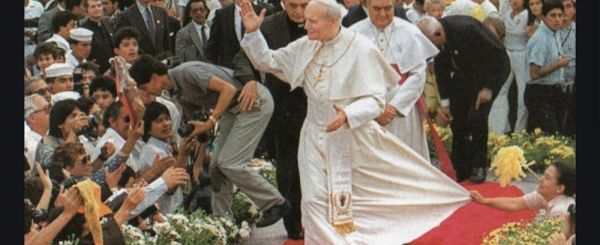1. "Who do you say that I am?" (Mt 16: 15).
Jesus asks the disciples this question about his identity while he is with them in upper Galilee. It often happened that they would ask Jesus questions; now it is he who questions them. His is a precise question that awaits an answer. Simon Peter speaks for them all: "You are the Christ, the Son of the living God" (Mt 16: 16).
The answer is extraordinarily clear. The Church's faith is perfectly reflected in it. We are reflected in it too. The Bishop of Rome, his unworthy successor by divine will, is particularly reflected in Peter's words. Around him and with him you are reflected in these words, dear Metropolitan Archbishops, who have come here from many parts of the world to receive the pallium on the Solemnity of Sts Peter and Paul.
I offer my cordial greetings to each of you, a greeting which I gladly extend to those who have accompanied you to Rome and to your communities who are spiritually united with us on this solemn occasion.
2. "You are the Christ!". Jesus replies to Peter's confession: "Blessed are you, Simon Bar-Jona! For flesh and blood has not revealed this to you, but my Father who is in heaven" (Mt 16: 17).
Blessed are you, Peter! Blessed because you could not have humanly recognized this truth, which is central to the Church's faith, except by God's action. "No one", Jesus said, "knows the Son except the Father, and no one knows the Father except the Son and any one to whom the Son chooses to reveal him" (Mt 11: 27).
We are reflecting on this extraordinarily rich Gospel passage: the incarnate Word had revealed the Father to his disciples; now is the moment when the Father himself reveals his only Only-begotten Son to them. Peter receives inner enlightenment and courageously proclaims: "You are the Christ, the Son of the living God!".
These words on Peter's lips come from the depths of God's mystery. They reveal the intimate truth, the very life of God. And Peter, under the action of the divine Spirit, becomes a witness and confessor of this superhuman truth. His profession of faith thus forms the firm basis of the Church's faith: "On this rock I will build my Church" (Mt 16: 18). The Church of Christ is built on Peter's faith and fidelity.
[Pope John Paul II, homily 29 June 2000]












